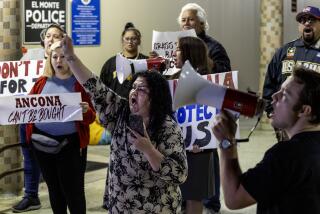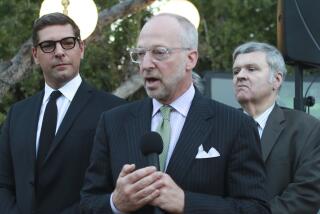In San Diego, the mayor’s office has a street fighter in Filner
SAN DIEGO — The allegations might have quickly chased a less combative politician from office: that he sexually harassed staff members and constituents, groping, grabbing, forcibly kissing, making lewd comments, making himself a “threat to all women.”
But San Diego Mayor Bob Filner is no average politician, having started out as a Freedom Rider in the civil rights movement and then spending three decades as an officeholder, including 20 years in Congress. His reputation is that of a street fighter — one with a loyal following among voters but few close allies among politicians.
The 70-year-old Democrat apologized for his misbehavior toward women and promised to seek professional care, although he denied that his conduct was sexual harassment. He also refused a demand from three ex-supporters and several high-ranking members of his party that he resign.
Now, 10 days into the controversy, he’s dug in for a fight, maybe in the courts, maybe against a recall movement.
San Diego, no stranger to political controversy at City Hall, is in a kind of a limbo: No claims or lawsuits have been filed, but the mayor, once a ubiquitous presence at community events, has largely dropped from public view, shunning the media that he once courted.
Late Friday, the county Sheriff’s Department opened a telephone hotline for anyone who wants to report sexual misconduct by Filner.
Filner has hired a top employment lawyer to fend off any claim or lawsuit and has rearranged his top staff to assure the public that the mayor’s office is still open for business.
A group of supporters has vowed to fight any recall, arguing that the mayor — long a champion of civil liberties — is being denied due process. The battle could devolve into a fight between activists from blue-collar neighborhoods south of Interstate 8 versus those from more affluent neighborhoods north of the freeway that is the traditional dividing line of San Diego politics.
To act as interim chief operating officer, Filner recruited Walt Ekard, a retired county chief administrative officer.
At $275,000 a year, Ekard will largely take over many of the duties that Filner had assumed: dealing with staff, working on large-scale projects, selecting top managers, even communicating with the public.
On Friday, Ekard released a two-minute video asking city employees not to be knocked off course.
“Our city is going through a rough time right now and reading the news every day can be demoralizing,” Ekard said. “But we have an important job to do and we need to stay focused on the task at hand.”
The changes in the mayoral staff are so sweeping that Steve Erie, a political science professor at UC San Diego, noted, only half in jest, that the mayor’s office has been put “in receivership.”
If Filner has dropped from sight, his supporters, initially stunned by the allegations, have gone public in an effort to regain the public relations momentum.
“You might as well get ready: we’re not going anywhere and he’s not going anywhere,” retired social worker Kathleen Harmon told a pro-Filner rally outside City Hall on Thursday night.
The city has a well-defined process for handling such claims within 45 days, either settling with the alleged victim or permitting him or her to file a lawsuit.
But if the person named in the claim is the mayor, the situation grows complex, officials said. They pointed out, for example, that city rules allow the mayor or department heads answerable to him to settle many claims under $50,000.
Would the mayor have to relinquish that authority? And should the city pay for an outside lawyer, as it did to the tune of millions of dollars for council members and bureaucrats ensnared in two other scandals in recent history?
Or are the allegations so outrageous, so “outside the scope” of his official duties, that the city has no responsibility to pay for lawyers to defend him?
“Legally, it’s a mess,” said Christopher Morris, who spent 15 years in the city attorney’s office and is now in private practice.
Republicans on the City Council have called on Filner to resign, as have two of the Democrats.
“I used to sell insurance policies for this type of thing and I’ve seen companies brought to their knees by one allegation of sexual misconduct or harassment,” said Councilman Scott Sherman, a newly elected Republican.
To mount a recall, the anti-Filner side would probably have to hire people to gather the 101,000 signatures of registered voters necessary to put the issue on a public ballot. But such an effort would be expensive and might fail, experts cautioned.
“Qualifying a citywide recall and being successful at recalling the mayor is highly unlikely,” said Chris Crotty, a nonaligned political consultant.
Bob Glaser, another nonaligned political consultant, agreed that a recall is difficult but added: “Anger [at Filner] is higher than I have ever seen it regarding an elected official.... But no one is ready to go out front and lead on the issue.”
Former Councilwoman Donna Frye and attorneys Marco Gonzalez and Cory Briggs — the former Filner supporters who brought the accusations to the public — have sought to shield the alleged victims from the media spotlight.
They have described the allegations but refused to provide names.
There is scant precedent for the situation. Two recent mayors left before their terms expired but for reasons wholly unlike those facing Filner, the city’s first Democratic mayor in two decades.
Roger Hedgecock resigned in 1985 after being convicted of conspiracy and other campaign-law violations; if he had not resigned, state law would have required his ouster. Dick Murphy resigned in 2005 amid complaints about his sluggish handling of the city’s pension crisis. Murphy, a former judge, thought it best for the city to have a fresh start.
The only recall in recent history was of a councilwoman removed in 1991 because constituents were unhappy at a redistricting plan.
The most high-profile sex scandal was in 1991, when a $100,000 “hush money” payoff was made to a city planner who complained she had been coerced into a sexual relationship with her boss. When word of the payoff leaked out, the boss was fired and an establishment lawyer was called in by the City Council to investigate the process and the secrecy.
In his video, Ekard made an oblique reference to problems “in the past,” scandals that may have faded in the public’s mind but are well-known among city employees and reporters.
Ekard said he is confident that employees will, as they have in the past, continue to perform “in spite of whatever distractions there may be.”
More to Read
Start your day right
Sign up for Essential California for news, features and recommendations from the L.A. Times and beyond in your inbox six days a week.
You may occasionally receive promotional content from the Los Angeles Times.






